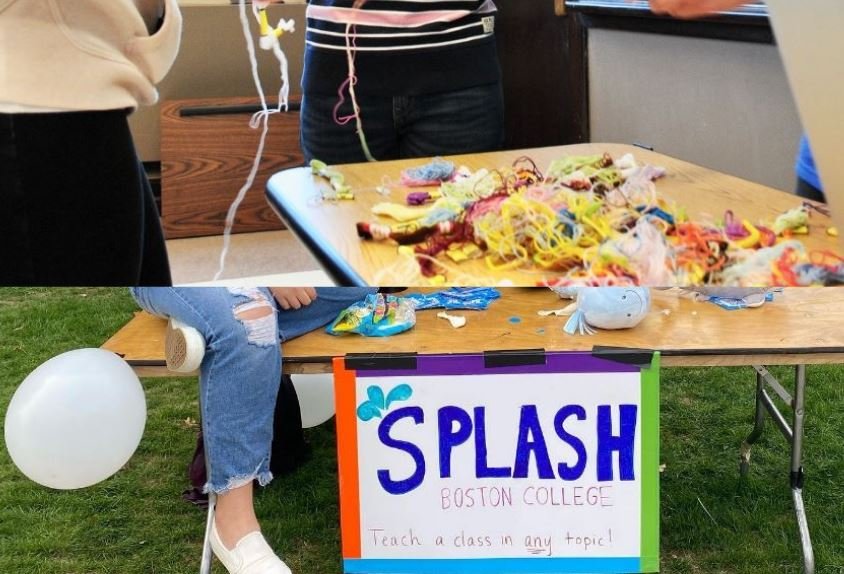
Every semester, Boston College undergoes a subtle metamorphosis that attracts hundreds of young minds to an experience that goes well beyond the typical classroom. Boston College Splash is more than just an occasion. It is a one-day educational immersion that aims to boost teachers’ and students’ confidence and spark curiosity. It is remarkably effective at bridging the generational divide, allowing middle or high school students to study subjects they never would have thought to study and college students to assume the role of educators.
For younger pupils, the experience is remarkably comparable to seeing the future unfold before them when they first set foot on a college campus. They’re not going to boring lectures. Rather, they are hand-picking from a remarkably wide range of subjects, from the geopolitical intricacy of contemporary conflicts to the cultural history of sneakers. An undergraduate or graduate student creates and leads each 50-minute class, which acts as a tiny spark—a succinct but impactful introduction to interests they might eventually pursue full-time.
Boston College Splash
| Detail | Information |
|---|---|
| Event Name | Boston College Splash |
| Organized By | Education by Students for Students (ESS) |
| Frequency | Once per semester |
| Location | Stokes South Hall, Boston College |
| Audience | Middle and high school students (Grades 6–12) |
| Instructors | Boston College undergraduate and graduate volunteers |
| Course Topics | Forensic science, global health, art, history, philosophy, social trends |
| Registration | Free for participants; open online |
| Contact | bcsplash@gmail.com |
| Website | https://bcsplash.learningu.org |
Splash significantly raises student engagement in a way that traditional education frequently cannot by providing access to non-traditional subjects taught in lively and frequently informal settings. Students have taken classes like “The Science of Superpowers,” “Decoding Pop Lyrics,” and “The Psychology of Villains,” for instance. These are stepping stones to more profound intellectual interest rather than just gimmicks. It is especially helpful that these lessons are taught by students who were sitting in similar classrooms not long ago because it adds a level of relatability and approachability.
The act of teaching itself has a similarly transformative effect. The club’s president and current senior, Nik Simonsen, described how, as a reluctant middle schooler, he first came across Splash at Yale. He remembers clearly taking classes on ancient texts and military history, which, somewhat unexpectedly, completely changed the way he thought about education. Years later, he came upon the ESS organization while browsing Boston College’s online club fair in the constrictive months of the 2020 pandemic. That moment of curiosity turned into a pivotal choice for the rest of my career. After years of facilitating captivating sessions and observing his peers follow suit, Simonsen now views Splash as a stepping stone for his development as a student, communicator, and potential professional.
He says that at first, teaching was frightening. However, the fear diminished as a result of careful planning, open experimentation, and cooperation with other educators. He learned how to reduce complicated ideas to straightforward stories while he stood in front of enthusiastic young minds. His public speaking and information-synthesis skills improved as a result of creating and delivering this content, and these abilities have been extremely effective in all facets of academic life.
Splash’s structure has grown remarkably strong in recent years. The program has greatly expanded its reach by utilizing contemporary digital platforms and forming strategic alliances with other departments. In the weeks before the event, the social media team helps create excitement by posting updates, class previews, and testimonies on a regular basis. Students are motivated to emulate their peers’ leadership and mentoring roles.
The effects don’t stop there. Splash’s philosophy has caught on throughout Greater Boston, leading to comparable projects at Brandeis, MIT, and Harvard. Although each of these programs is distinct, they all have the same basic goal: to provide students with the freedom and opportunity to teach what they are passionate about and to pique students’ interest in subjects that aren’t often covered in conventional middle and high school settings. These initiatives are a part of a broader educational movement that prioritizes mentorship, agency, and creativity over rote memorization.
Splash programs have become more in line with larger discussions about educational reform during the last ten years. Initiatives like Splash offer something pleasantly human in the face of mounting pressure on performance on standardized tests. They help students rediscover the joy of learning in and of itself. By incorporating current principles like “sharing passions,” “reframing education,” and “encouraging participation,” BC Splash is transforming academic culture into something incredibly transparent and intimate.
The atmosphere on campus is further raised by occasions like Boston College’s Polar Plunge, which is frequently held close to Splash. In order to support the Massachusetts Special Olympics, students jump into freezing water to raise money, serving as a reminder to all that service and education can—and frequently should—go hand in hand. The Boston College Police Department and student volunteers worked together to organize these fundraisers, which have greatly eased the financial burden on programs that assist people with intellectual disabilities. It raised over $10,000 more than it had hoped to last year alone.
The organizers intend to expand Splash beyond its current format in the upcoming years. There are plans to broaden the topics to include more STEM labs and interactive creative workshops, as well as to include virtual participation for students who are unable to travel. The goal is to make it more accessible rather than more complicated so that more students can take advantage of what has already shown itself to be a very flexible platform.
The variety of classes offered at Boston College Splash and the passion of its teachers aren’t the only things that set it apart. It’s the attitude—one of openness, inclusivity, and respect for one another. Students are regarded as intellectual equals in this setting. Teachers share their passions rather than giving lectures. This small change in tone can have a huge impact on a sixth grader who is interested in space travel or a high school student who is having a hard time enjoying their textbooks.
Mentorship is receiving more attention in higher education, and initiatives like Splash offer a particularly creative example of how mentorship can begin earlier and become more reciprocal. Boston College is changing the trajectory from student to leader by enabling undergraduates to instruct and young students to ask bold questions.
The ability of BC Splash to highlight something that is frequently obscured by grade-point averages and college preparation—imagination—may be its greatest strength. A student might study philosophy, psychology, environmental justice, and jazz history in a single Saturday. By doing this, they start to build a more comprehensive self-image in addition to increasing their intellectual vocabulary.

